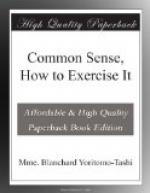“Or again:
“Being granted the principle that like causes produce like effects, as I have just affirmed, and that there exist certain incompatibilities between the contingencies of the past and those of to-day, one must allow that these incompatibilities will produce different results.
“And, after this reasoning, the deductions will be established by constituting a comparison in favor of either the present or past state of things.”
But the philosopher, who thinks of everything, has foreseen the case where false ideas have obscured the clearness of the deductions, and he said to us:
“The association of false ideas, if it does not proceed from the difficulty of controlling things, is always in ungovernable opposition to the veracity of the deduction.
“What would be thought of a man of eighty years who, coming back to his country after a long absence, said, on seeing the family roof from a distance:
“’When I was twenty years old, in leaving here, it took me twenty minutes to reach the home of my parents, so I shall reach the threshold in twenty minutes.’
“The facts would be exact in principle.
“The distance to be covered would be the same; but legs of eighty years have not the same agility as those of very young people, and in predicting that he will reach the end of his walk in the same number of minutes as he did in the past, the old man would deceive himself most surely.
“If, on the contrary, on reaching the same place he perceived that a new route had been made, and that instead of a roundabout way of approach, as in the past, the house was now in a straight line from the point where he was looking at it, it would be possible to estimate approximately the number of minutes which he could gain on the time employed in the past, by calculating the delay imposed upon him by his age and his infirmities.
“Those to whom deduction is familiar, at times astonish thoughtless persons by the soundness of their judgment.
“A prince drove to his home in the country in a sumptuous equipage.
“He was preceded by a herald and borne in a palanquin by four servants, who were replaced by others at the first signs of fatigue, in order that the speed of the journey should never be slackened.
“As they were mounting, with great difficulty, a zigzag road which led up along the side of a hill, one of these men cried out:
“‘Stop,’ said he, ‘in the name of Buddha, stop!’
“The prince leaned out from the palanquin to ask the cause of this exclamation:
“‘My lord,’ cried the man, ’if you care to live, tell your porters to stop!’
“The great man shrugged his shoulders and turning toward his master of ceremonies, who was riding at his side, said:
“‘See what that man wants.’
“But scarcely had the officer allowed his horse to take a few steps in the direction of the man who had given warning when the palanquin, with the prince and his bearers, rolled down a precipice, opened by the sinking in of the earth.




